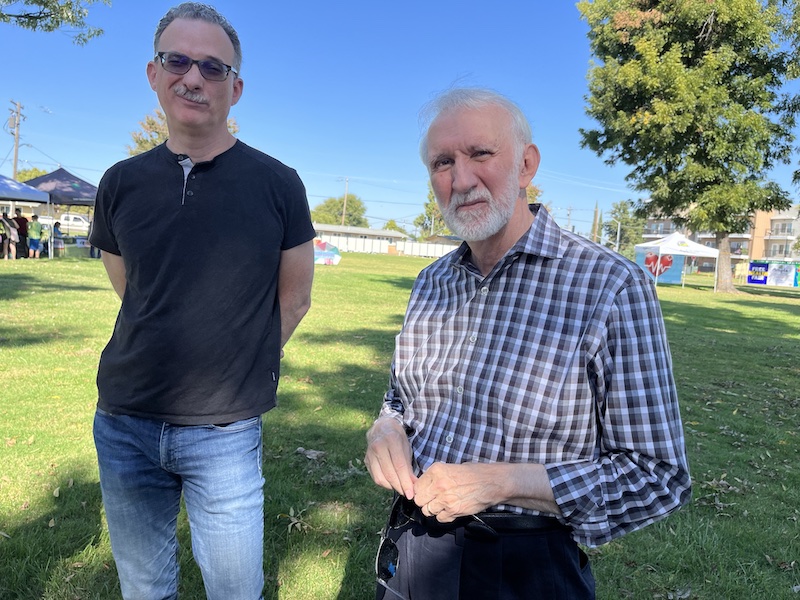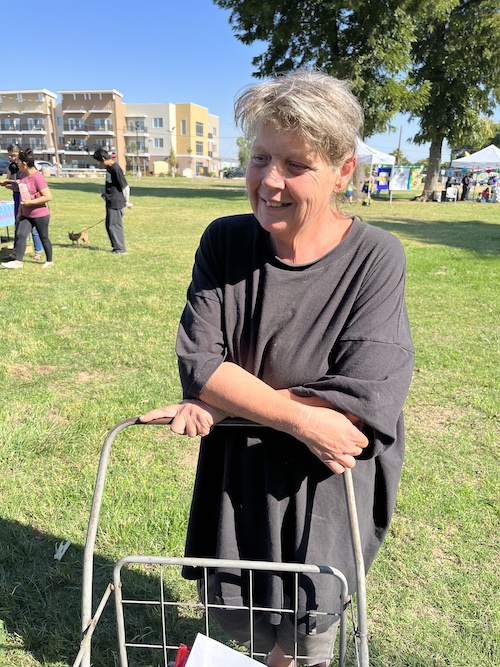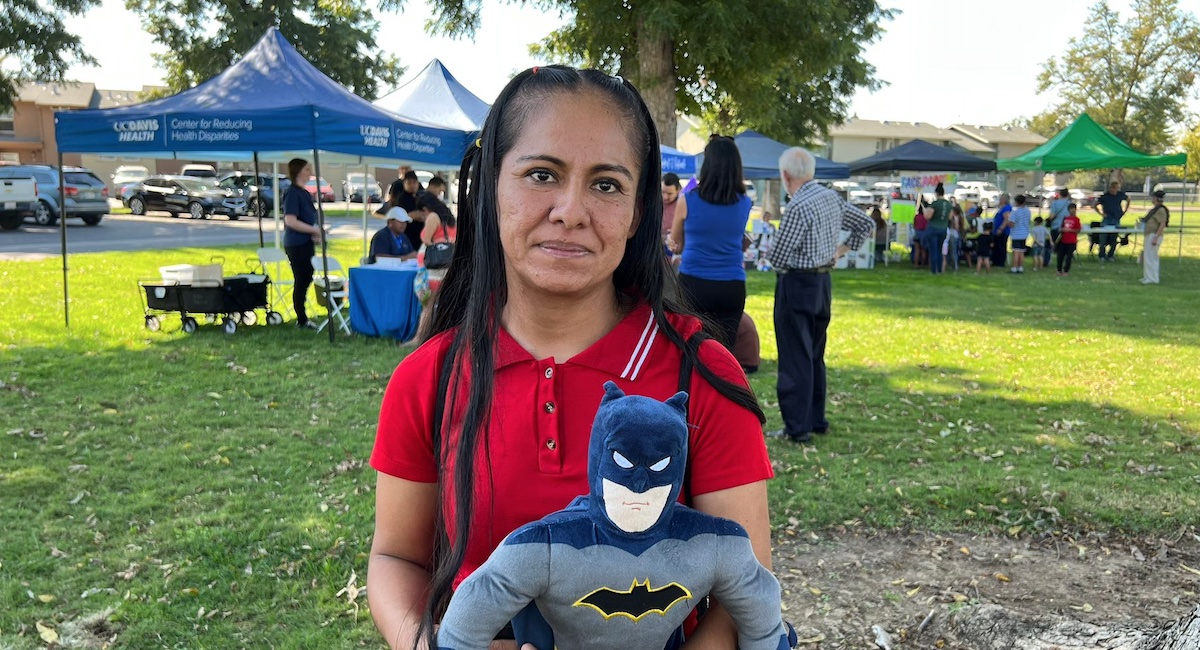Above: Angela Ramirez was among those who attended a weekend health fair in Yuba City, California to learn about ways to access healthcare for her and her family. (Credit: Manuel Ortiz)
YUBA CITY, CA. — In rural areas of California where broadband access and public transportation are limited, and where some lack even cell phones, weekend health fairs help agencies and providers bridge a vast information gap.
Amid a statewide effort to redetermine eligibility for Medi-Cal, a health fair in Yuba City, California on Sunday Oct. 8 drew hundreds of residents.
The event was organized by Ampla Health and sponsored by the UC Davis Center for Reducing Health Disparities (CRHD). Booths included the Yuba City Police Department, California Rural Legal Assistance, the state Employment Development Department, and Every Woman Counts, a state program which offered free breast cancer screenings at the fair.
Free lunch, dining tables set with flower decorations, a children’s play area, raffle prizes and a DJ booth gave the fair a festive atmosphere.
Lucy Candito, a patient navigator at Ampla, said exactly 354 people attended the fair, which was the clinic’s twenty-third.
“We suspended the fair in 2020 and 2021 due to COVID, and since it’s been back, we’re seeing a lot more people,” said Candito. “There’s a lot of interest and need this year from people who haven’t renewed their health care in three years; this year’s been our busiest with renewals, especially as we prepare to help more undocumented folks to enroll.”
Ampla is a nonprofit network of community-based health centers providing managed care to low-income residents throughout Yuba City and surrounding Sutter County. Under managed care, the state contracts with local health insurance plans — like Kaiser and Blue Cross — to provide Medi-Cal services to enrollees.
Yuba City, a largely rural community centered in the Sacramento Valley about 40 miles north of Sacramento, is home to a sizable farmworker community, many of them low-income and undocumented.
Alongside this population is a large Punjabi community, as well as growing numbers of Afghans, Venezuelans, Guatemalans and other recently settled groups arriving as part of a wave of asylum-seekers crossing the U.S.-Mexico border.
‘Treat them where they are’
The fair comes as California becomes the first state to extend Medicaid eligibility to all undocumented residents; come January 2024, one million will be newly eligible. Currently, undocumented people under 26 and over 49 are eligible.
Medi-Cal, California’s Medicaid program, is “the most accessible health insurance for communities like this,” said CRHD Director Dr. Sergio Aguilar, an internal medicine professor at UC Davis.
“It’s the great beauty of this state: it protects its residents, who are contributing to the economy in a very concrete way,” added Aguilar, who offered mental health and blood pressure screenings during the fair at a booth with cardiologist colleague Dr. Javier Lopez.
“Especially when it comes to farmworkers” — who face cultural taboos about acknowledging physical and mental health issues and often work seven days a week — “we have to treat physical and mental stressors as interconnected and treat them where they are — go to the fields, ask when they’re available,” he explained.

Nevertheless, farmworkers have some of the lowest rates of hospital visits among any other group in the state. Reasons include confusion about eligibility, lack of physical access, lack of accurate information in Spanish or Indigenous languages, and fear that use of government benefits will render them vulnerable to deportation.
George Masih, a 60-year-old Sikh man who attended the fair, said he arrived from India a week ago on an immigration visa sponsored by his daughter. He said his next priority was to get health insurance but was reluctant to talk any further about the enrollment process.
15 million Californians are currently enrolled under MediCal, including 5.7 million children. The majority — 70% — come from communities of color.
Medi-Cal redetermination
During the pandemic, annual eligibility updates were suspended for those enrolled in Medi-Cal, in order to prevent health care losses; since the end of the federal COVID-19 emergency declaration last May, this process has resumed and enrollees have begun receiving yellow envelopes from the Department of Health Care Services (DHCS) seeking updated information.
Two to three million Californians are now expected to lose their coverage, and to date over 300,000 have lost it since July 1. The redetermination process began in April 2023 (though California delayed actual disenrollment as long as possible, until July) and will end April 2024.

Beginning in January 2024, furthermore, all low-income Californians regardless of immigration status will become eligible for coverage under the program, which includes typical medical and preventive care as well as dental care, prescription coverage, substance abuse recovery, mental health, and maternity care including doula services.
“I don’t know anything about reenrollment,” said Leah, 54, an unhoused woman who attended the fair. Prescription glasses are a necessity for her, as “I read anything I can get my hands on.”
Not owning a cell phone, she said she receives mail through Hands for Hope, a local shelter, but didn’t receive a notice about her Medi-Cal status as she hasn’t checked her mail for a year, and previously thought that food stamp recipients were automatically enrolled in care.
“I go to the local clinic,” said Leah, “I’m there for maybe 30 minutes, but they don’t say anything. So, I know now I better go check on that to make sure I still qualify. I am stunned at this point not knowing.”
Angela Ramirez, 29, attended the fair with her two children.
“I don’t know much about MediCal,” said Ramirez, a farmworker recently arrived from Mexico. “I heard there were people here who can help me get registered.”
She said she had no insurance, emphasizing that health care was critical for farmworkers laboring in difficult conditions and “in cases of emergency, especially with your kids.” When told that she could enroll come January, her face lit up.
Terry Lindley, a 72-year-old resident of the housing complex fairgrounds, attended the event with a friend named Richard. She said dental care was a priority for both – but finding dentists who take Medi-Cal patients has proved difficult.
Lindley said she came to the fair not knowing anything about renewing Medi-Cal eligibility, “but I think it’s important. That’s the most important thing we’ve learned by coming here.”
Additional reporting by Peter Schurmann and Sandy Close.




